The demand for acerola extract in Japan is expected to grow from USD 1.1 billion in 2025 to USD 2.1 billion by 2035, reflecting a compound annual growth rate (CAGR) of 6.4%. Acerola extract, derived from the fruit of the Acerola cherry, is widely valued for its high vitamin C content and antioxidant properties, making it a key ingredient in nutraceuticals, dietary supplements, and cosmetic products. The demand for acerola extract is increasingly driven by consumer preference for natural and functional ingredients in both food and wellness products, as well as the growing awareness of the importance of immune health and skin care.
As Japan’s population ages and consumers become more health-conscious, the demand for vitamin C-rich products will continue to rise, and acerola extract will play a significant role in providing natural alternatives to synthetic vitamin C. Furthermore, the increasing trend toward clean label products and natural skincare solutions further boosts the demand for acerola extract, as it is regarded as a safer and more effective ingredient compared to synthetic substitutes. The global demand for natural, plant-based ingredients is rising, and Japan is no exception, with both the food and beverage industry, as well as the cosmetics sector, increasingly turning to acerola extract to meet consumer needs for sustainable and health-promoting products.
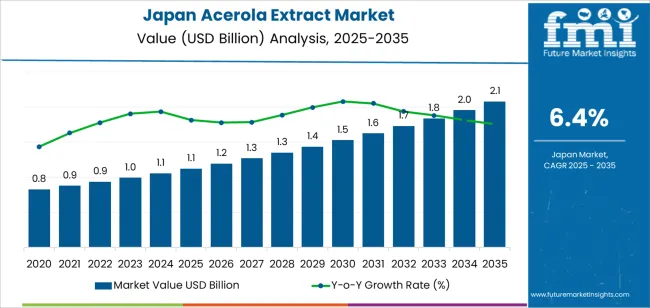
The growth of the acerola extract industry in Japan is influenced by various macroeconomic indicators, and its elasticity is highly responsive to several economic factors. Economic growth, consumer income levels, and consumer spending habits all play a role in determining the industry's growth trajectory. When Japan experiences periods of economic expansion, disposable income increases, allowing consumers to invest more in premium health products and functional foods. This leads to increased demand for acerola extract, which is perceived as a high-value, health-enhancing ingredient.
Rising healthcare costs and the aging population contribute to the growing demand for natural, preventive health products like acerola extract. The demand for acerola extract is also sensitive to fluctuations in raw material prices. The cost of producing acerola extract depends on various factors, including agricultural yields, weather conditions, and supply chain stability. Price volatility in these areas can influence the cost of acerola extract, which in turn affects the pricing strategies and profit margins of companies involved in its production and sale. As demand for natural, plant-based alternatives increases, the long-term outlook for the industry remains positive.
| Metric | Value |
|---|---|
| Demand for Acerola Extract in Japan Value (2025) | USD 1.1 billion |
| Demand for Acerola Extract in Japan Forecast Value (2035) | USD 2.1 billion |
| Demand for Acerola Extract in Japan Forecast CAGR (2025-2035) | 6.4% |
The demand for acerola extract in Japan is growing due to its high vitamin C content and the increasing consumer preference for natural, plant-based health products. Acerola extract, derived from the acerola cherry, is widely used in dietary supplements, functional foods, beverages, and skincare products. Its potent antioxidant properties, as well as its ability to boost immune health, are key factors driving its increasing popularity in Japan’s health and wellness industry.
A key driver behind this demand is the growing focus on immunity and preventive health. Consumers are more inclined to seek natural and effective ways to support their immune systems, and acerola extract’s rich vitamin C content makes it a preferred option. Furthermore, acerola extract is increasingly being used in clean-label products as it aligns with the rising demand for transparent, all-natural ingredients that do not contain artificial additives or preservatives.
The demand for acerola extract in skincare products is rising due to its anti-aging and skin-brightening properties. As more Japanese consumers seek functional beauty products that offer health benefits, acerola extract is gaining attention for its ability to improve skin health. The trend toward plant-based and sustainable ingredients in both food and personal care products is further contributing to the growth of acerola extract demand in Japan, with this industry expected to expand steadily through 2035.
Demand for acerola extract in Japan is segmented by product form and application. By product form, demand is divided into liquid and powder, with liquid holding the largest share at 70%. The demand is also segmented by application, including food supplements, beverages, confectionery products, snacks, meat preservation, and bakery preservation, with food supplements leading the demand at 28.0%. Regionally, demand is divided into Kanto, Kinki, Chubu, Kyushu & Okinawa, Tohoku, and the Rest of Japan.
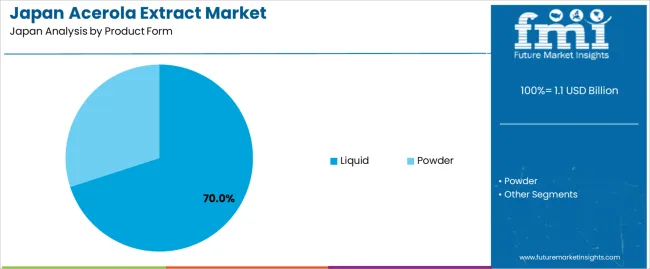
Liquid acerola extract accounts for 70% of the demand for acerola extract in Japan. The liquid form is preferred for its ease of incorporation into a wide range of products, particularly beverages and food supplements. Liquid extracts offer superior bioavailability, meaning they are more easily absorbed by the body compared to powdered forms. This makes liquid acerola extract a popular choice in health and wellness products, where the focus is on delivering a potent concentration of nutrients, particularly vitamin C. Liquid acerola extract is more versatile and flexible in product formulation, making it ideal for use in a variety of applications, from functional beverages to dietary supplements. As the demand for natural health solutions grows, particularly for vitamin-rich products, the preference for liquid acerola extract will continue to rise.
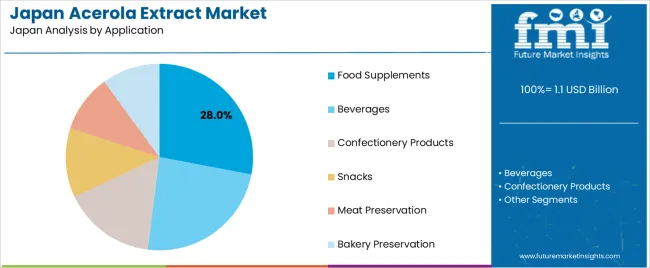
Food supplements account for 28.0% of the demand for acerola extract in Japan. Acerola extract, known for its high vitamin C content, is a popular ingredient in dietary supplements aimed at boosting immune health and overall wellness. As consumers become more health-conscious, there is a growing demand for natural, plant-based sources of nutrients. Acerola extract is an excellent alternative to synthetic vitamin C supplements due to its high potency and natural sourcing. It is commonly used in multivitamins, immune-boosting supplements, and other functional health products. The versatility of acerola extract in various forms, including liquid and powder, makes it suitable for a wide range of supplement formats, including capsules, tablets, and liquid formulations. With the increasing focus on preventive healthcare and natural products, the demand for acerola extract in food supplements will continue to grow in Japan.
In Japan, demand for acerola extract is rising particularly in functional foods, dietary supplements and beauty‑&‑wellness applications. The ingredient valued for its high vitamin C content and antioxidant properties is increasingly adopted as part of the clean‑label and plant‑based ingredient trend. Growth of health‑oriented consumer industrys and the expansion of premium skincare and nutraceutical products support uptake. Key restraints include higher costs of sourcing and processing premium acerola extract, limited domestic cultivation, regulatory requirements for health claims and ingredient approval, and competition from other botanical extracts or synthetic vitamin C sources.
Why is Demand for Acerola Extract Growing in Japan?
Demand for acerola extract in Japan is growing because consumers and brands alike are focusing more on health, immunity and skin‑care benefits tied to natural ingredients. Acerola’s reputation as a super‑fruit rich in vitamin C and antioxidants makes it attractive for supplement‑makers, beverage manufacturers and cosmetic formulators in Japan. Brands want to leverage its botanical origin and clean‑label appeal, while Japanese consumers increasingly expect premium product quality and ingredient transparency. The ageing population and emphasis on preventive health and wellness create a supportive environment for novel botanical extracts like acerola.
How are Technological Innovations Driving Growth of Acerola Extract in Japan?
Technological innovations are aiding growth of acerola extract in Japan by improving extraction methods, enhancing product stability and enabling new delivery formats. Advanced drying or concentration methods help preserve vitamin C potency, while encapsulation or micro‑particle technologies permit incorporation of acerola extract in beverages, powders, skincare formulations and nutraceuticals. Supply‑chain innovations (such as better logistics for imported cherries, standardized extract quality) also reduce variability, making it easier for Japanese manufacturers to adopt. These developments expand the applications of acerola extract across food, supplement and cosmetic sectors, thereby expanding its industry footprint in Japan.
What are the Key Challenges Limiting Adoption of Acerola Extract in Japan?
Despite growing momentum, adoption of acerola extract in Japan faces some challenges. The cost of high‑quality botanical extract remains elevated compared to more established vitamin C sources, which may limit its use in cost‑sensitive products. Regulatory hurdles—especially for health‑claim substantiation, novel‑ingredient approval and labelling also slow innovation and launch cycles. Supply‑chain dependencies, such as reliance on imported cherries or extracts, may introduce lead‑time or quality variability. Competition from alternative antioxidant botanicals, synthetic vitamin C or lower‑cost extracts could dampen pricing and penetration growth in some segments.
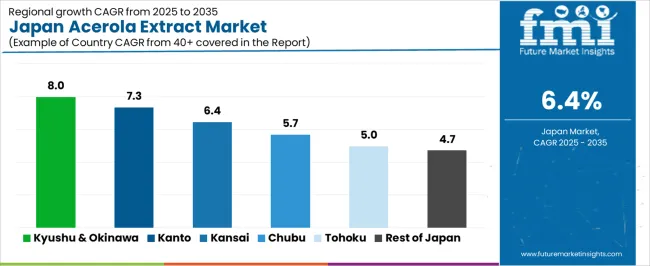
| Region | CAGR (%) |
|---|---|
| Kyushu & Okinawa | 8.0% |
| Kanto | 7.3% |
| Kinki | 6.4% |
| Chubu | 5.7% |
| Tohoku | 5.0% |
| Rest of Japan | 4.7% |
Demand for acerola extract in Japan is growing steadily across all regions, with Kyushu & Okinawa leading at an 8.0% CAGR. The Kanto region follows closely with a 7.3% CAGR, supported by its large population and high demand for natural health supplements. Kinki experiences a 6.4% CAGR, with acerola extract being incorporated into functional foods and beverages aimed at promoting immune health. Chubu shows a 5.7% CAGR, driven by the increasing consumer interest in natural ingredients and supplements. Tohoku and the Rest of Japan show steady demand at 5.0% and 4.7% CAGR, respectively, as the trend toward health supplements and wellness continues to spread across the country.
Kyushu & Okinawa lead Japan in the demand for acerola extract, with an 8.0% CAGR. This demand is primarily driven by the region’s health-conscious population, particularly in Okinawa, which is renowned for its longevity and focus on natural, nutrient-rich foods. Acerola extract, rich in vitamin C and antioxidants, is increasingly used in supplements, beverages, and functional foods aimed at enhancing immune health and overall wellness. The region’s interest in traditional, natural ingredients, combined with its agricultural base for growing acerola fruit, is contributing to the demand for this extract. Okinawa’s emphasis on preventative health and healthy aging aligns with the growing popularity of acerola extract as a key ingredient in health products. As the region continues to prioritize wellness and longevity, the demand for acerola extract is expected to grow steadily, making Kyushu & Okinawa a key industry for this product in Japan.
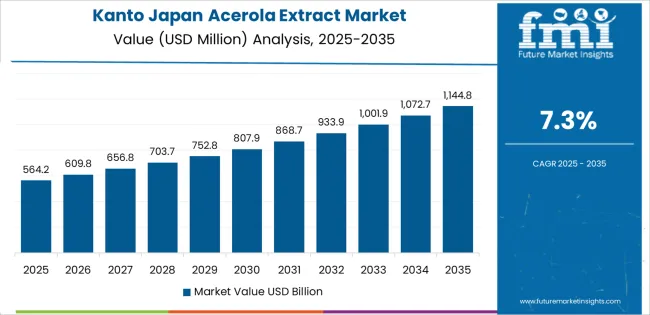
Kanto is experiencing strong demand for acerola extract, with a 7.3% CAGR. The demand in this region is driven by its large and health-conscious population, particularly in urban centers like Tokyo, where natural health products are increasingly popular. Acerola extract is widely used in dietary supplements, functional beverages, and health food products due to its high vitamin C content and immune-boosting properties. The region’s growing awareness of the importance of nutrition and wellness has spurred demand for natural ingredients like acerola extract. Kanto’s strong pharmaceutical and food industries are increasingly incorporating acerola extract into their product lines, responding to consumer demand for more natural, plant-based health solutions. As consumer trends continue to shift toward wellness and prevention, demand for acerola extract is expected to grow steadily in Kanto, driven by both consumer preferences and the region’s well-established industries.
Kinki is witnessing steady demand for acerola extract, with a 6.4% CAGR. The region’s demand is largely driven by its strong food processing and beverage industries, particularly in cities like Osaka and Kyoto, where there is growing interest in functional foods and beverages. Acerola extract, known for its immune-boosting properties and high vitamin C content, is increasingly being used in the production of juices, health drinks, and dietary supplements. The region’s large consumer base, combined with the rising trend of natural and organic ingredients, has led to the increased use of acerola extract in health-focused products. Kinki’s established food and beverage manufacturing sector is also adopting acerola extract as a key ingredient in health formulations, further driving demand. As the region continues to focus on innovative health products and wellness, the demand for acerola extract is expected to remain strong and grow steadily.
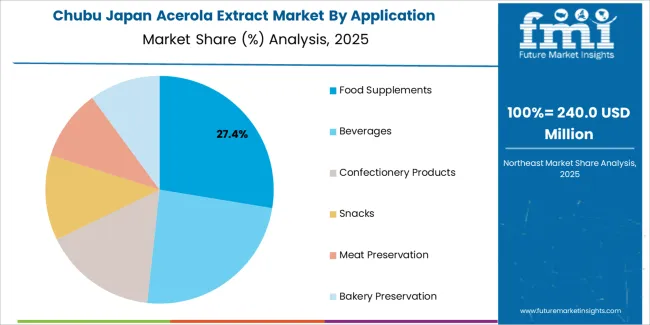
Chubu is experiencing moderate demand for acerola extract, with a 5.7% CAGR. The region’s demand is driven by the increasing popularity of natural, plant-based ingredients in the health food and supplement sectors. In cities like Nagoya, local food manufacturers are incorporating acerola extract into their product lines to meet consumer demand for immunity-boosting ingredients. Chubu’s growing health-conscious consumer base is fueling the demand for functional foods and beverages containing acerola extract, particularly those aimed at enhancing immunity and overall health. The region’s expanding focus on wellness, combined with its strong pharmaceutical and food processing industries, is supporting the adoption of acerola extract. As Chubu continues to see growth in its health-focused food industry, the demand for acerola extract is expected to rise steadily, driven by the region’s evolving consumer preferences and increasing interest in natural health solutions.
Tohoku is experiencing steady demand for acerola extract, with a 5.0% CAGR. The demand is largely driven by the region’s growing interest in natural health products and the adoption of functional foods. As consumers in Tohoku become more health-conscious, there is a rising preference for natural ingredients like acerola extract, known for its vitamin C content and antioxidant properties. The region’s focus on improving public health and wellness, particularly in rural areas, is contributing to the demand for dietary supplements and functional foods containing acerola extract. Local food manufacturers are incorporating acerola into their products, responding to the increasing consumer demand for health-promoting ingredients. While Tohoku’s growth rate is slower compared to other regions, the steady rise in consumer interest in natural and functional food products is expected to drive continued demand for acerola extract in the region.
The Rest of Japan is seeing moderate demand for acerola extract, with a 4.7% CAGR. This growth is driven by the increasing adoption of health-conscious products in smaller regions and rural areas, where consumers are becoming more aware of the benefits of natural ingredients like acerola. Local food manufacturers are incorporating acerola extract into their product lines, particularly in functional foods, beverages, and supplements aimed at boosting immune health. As the demand for wellness products continues to rise across Japan, smaller regions are gradually embracing the trend toward natural, plant-based ingredients. The Rest of Japan’s growing focus on health and wellness, combined with the increasing availability of acerola-based products, will drive the steady demand for acerola extract. As consumer preferences continue to shift toward natural and functional foods, the adoption of acerola extract is expected to grow at a moderate pace across the rest of the country.
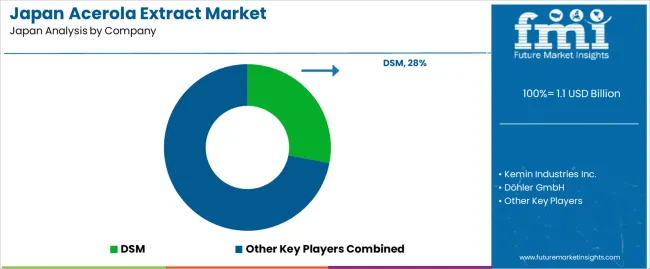
In Japan, demand for acerola extract is growing as consumers increasingly seek natural, nutrient‑rich ingredients for dietary supplements, functional foods and beauty products. Acerola extract derived from the acerola cherry is valued for its high vitamin C content and antioxidant properties, making it attractive for food & beverage fortification as well as skincare and personal care applications. Rising interest in clean‑label, plant‑based and health‑focused formulations is supporting adoption across Japanese nutrition and wellness industrys.
Key suppliers in the Japanese acerola extract space include DSM with an approximate share of 28.0%, Kemin Industries Inc., Döhler GmbH, Naturex (a Givaudan business) and Nexira. DSM leads through its global ingredient‑supply infrastructure, technical support for formulators and strong distribution network that serves Japanese brand‑owners. Other firms compete by offering specialised extraction technologies, organic‑certified grades, localised service for Japanese regulatory requirements and tailored ingredient systems for functional food and cosmetic uses.
Competitive dynamics in Japan’s acerola extract industry revolve around several major factors. A prominent driver is the growing consumer focus on health, immunity and natural ingredients, which encourages brands to incorporate acerola extract into supplements, beverages and skincare. Another driver is the proliferation of functional formulations requiring antioxidants and natural vitamin C, thus elevating the demand for high‑quality extract grades. Challenges exist: raw‑material sourcing (due to geographic growing regions), higher cost versus synthetic alternatives, and stringent quality and regulatory standards in Japan. Suppliers that ensure stable feedstock supply, maintain certified extraction processes, provide robust technical and regulatory support and collaborate closely with Japanese formulators are best positioned to succeed in the Japan acerola extract segment.
| Items | Values |
|---|---|
| Quantitative Units (2025) | USD billion |
| Product Form | Liquid, Powder |
| Application | Food Supplements, Beverages, Confectionery Products, Snacks, Meat Preservation, Bakery Preservation |
| Region | Kyushu & Okinawa, Kanto, Kinki, Chubu, Tohoku, Rest of Japan |
| Key Companies Profiled | DSM, Kemin Industries Inc., Döhler GmbH, Naturex (Givaudan), Nexira |
| Additional Attributes | Dollar sales by product form and application; regional CAGR and adoption trends; demand trends in acerola extract; growth in food supplements, beverages, and preservation sectors; technology adoption for ingredient applications; vendor offerings including raw materials and formulations; regulatory influences and industry standards |
The demand for acerola extract in Japan is estimated to be valued at USD 1.1 billion in 2025.
The market size for the acerola extract in Japan is projected to reach USD 2.1 billion by 2035.
The demand for acerola extract in Japan is expected to grow at a 6.4% CAGR between 2025 and 2035.
The key product types in acerola extract in Japan are liquid and powder.
In terms of application, food supplements segment is expected to command 28.0% share in the acerola extract in Japan in 2025.






Our Research Products

The "Full Research Suite" delivers actionable market intel, deep dives on markets or technologies, so clients act faster, cut risk, and unlock growth.

The Leaderboard benchmarks and ranks top vendors, classifying them as Established Leaders, Leading Challengers, or Disruptors & Challengers.

Locates where complements amplify value and substitutes erode it, forecasting net impact by horizon

We deliver granular, decision-grade intel: market sizing, 5-year forecasts, pricing, adoption, usage, revenue, and operational KPIs—plus competitor tracking, regulation, and value chains—across 60 countries broadly.

Spot the shifts before they hit your P&L. We track inflection points, adoption curves, pricing moves, and ecosystem plays to show where demand is heading, why it is changing, and what to do next across high-growth markets and disruptive tech

Real-time reads of user behavior. We track shifting priorities, perceptions of today’s and next-gen services, and provider experience, then pace how fast tech moves from trial to adoption, blending buyer, consumer, and channel inputs with social signals (#WhySwitch, #UX).

Partner with our analyst team to build a custom report designed around your business priorities. From analysing market trends to assessing competitors or crafting bespoke datasets, we tailor insights to your needs.
Supplier Intelligence
Discovery & Profiling
Capacity & Footprint
Performance & Risk
Compliance & Governance
Commercial Readiness
Who Supplies Whom
Scorecards & Shortlists
Playbooks & Docs
Category Intelligence
Definition & Scope
Demand & Use Cases
Cost Drivers
Market Structure
Supply Chain Map
Trade & Policy
Operating Norms
Deliverables
Buyer Intelligence
Account Basics
Spend & Scope
Procurement Model
Vendor Requirements
Terms & Policies
Entry Strategy
Pain Points & Triggers
Outputs
Pricing Analysis
Benchmarks
Trends
Should-Cost
Indexation
Landed Cost
Commercial Terms
Deliverables
Brand Analysis
Positioning & Value Prop
Share & Presence
Customer Evidence
Go-to-Market
Digital & Reputation
Compliance & Trust
KPIs & Gaps
Outputs
Full Research Suite comprises of:
Market outlook & trends analysis
Interviews & case studies
Strategic recommendations
Vendor profiles & capabilities analysis
5-year forecasts
8 regions and 60+ country-level data splits
Market segment data splits
12 months of continuous data updates
DELIVERED AS:
PDF EXCEL ONLINE
Acerola Extract Market Analysis – Size, Share, & Forecast Outlook 2025 to 2035
Demand for Coffee Extracts in Japan Size and Share Forecast Outlook 2025 to 2035
Japan Faith-based Tourism Market Size and Share Forecast Outlook 2025 to 2035
Japan Sports Tourism Market Size and Share Forecast Outlook 2025 to 2035
Japan Respiratory Inhaler Devices Market Size and Share Forecast Outlook 2025 to 2035
Japan Halal Tourism Market Size and Share Forecast Outlook 2025 to 2035
Japan Automated People Mover Industry Size and Share Forecast Outlook 2025 to 2035
Japan Automotive Load Floor Industry Analysis Size and Share Forecast Outlook 2025 to 2035
Japan Food Cling Film Market Size and Share Forecast Outlook 2025 to 2035
Japan Polypropylene Packaging Films Market Size and Share Forecast Outlook 2025 to 2035
Extraction Kits Market Analysis - Size, Share, and Forecast Outlook 2025 to 2035
Japan Probiotic Yogurt Market is segmented by product type, source type, nature type, flavor type, fat content, sales channel and key city/province through 2025 to 2035.
japan Tortilla Market - Growth, Trends and Forecast from 2025 to 2035
Japan Cosmetics ODM Market Analysis - Size, Share & Trends 2025 to 2035
Japan Automotive Turbocharger Market Insights – Demand, Size & Industry Trends 2025–2035
Japan Yeast Market Insights – Demand, Size & Industry Trends 2025–2035
Japan Green and Bio-based Polyol Market Insights – Demand, Size & Industry Trends 2025–2035
Japan Natural Food Color Market Trends – Growth, Demand & Forecast 2025–2035
Japan Coated Fabrics Market Growth – Trends, Demand & Innovations 2025–2035
Japan Barite Market Growth – Trends, Demand & Innovations 2025–2035

Thank you!
You will receive an email from our Business Development Manager. Please be sure to check your SPAM/JUNK folder too.
Chat With
MaRIA